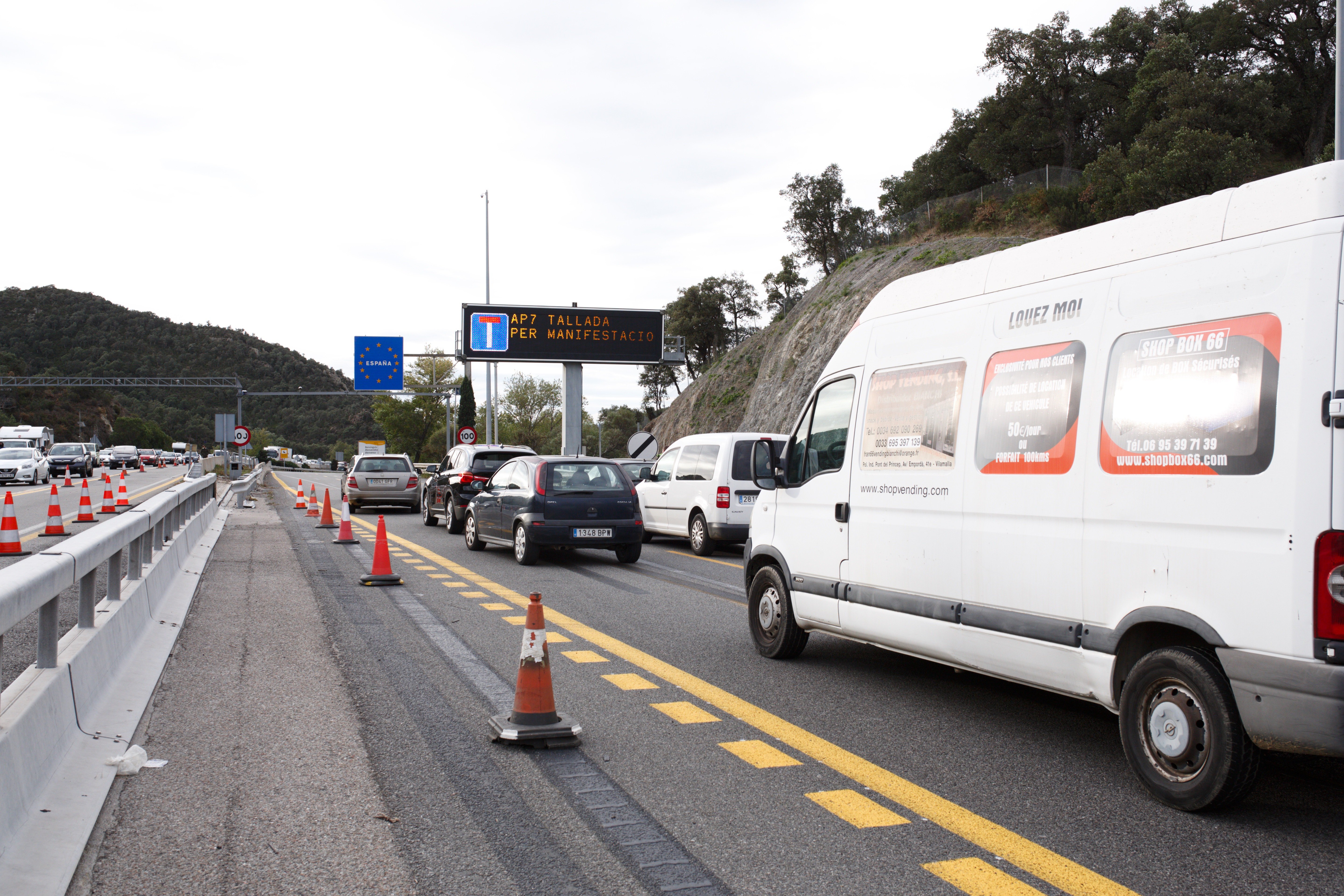Le Perthus, in France but right on the border with Spain, is the sort of village which is normally a place people pass through on their way elsewhere. Today, however, it's a destination all by itself, at least for protesters, police and the press. It was 8:35 this morning when cars started coming back south from Perpignan through the toll booths to block the crossing between France and Catalonia. As the tailbacks started to build, others would come by foot. The motorway, known as the A9 on the French side, the AP-7 in Spain, is one of the main routes across the Pyrenees.
This was the plan announced by protest platform Tsunami Democràtic late last week as their "most ambitious action yet". At that point, they were keeping the exact idea close to their chest, simply telling supporters to prepare to be out for three days and to bring warm clothing, provisions and camping gear. The secrecy allowed them to arrive by surprise, one step ahead of the police, for their latest attempt to bring international attention to their complaints about prison terms handed down last month to pro-independence leaders. The message: "Spain, sit and talk."
All the action is taking place on the French side of the border. This has several objectives: to increase the international profile of the protest, to bring in support from Northern Catalonia (territory ceded to France by Spain in a 17th century treaty) and to take things out of the jurisdiction of Spanish and Catalan police and courts.
By afternoon, hundreds of cars were blocking the road and a stage was being set up right on the border for speeches and music. Food was served at 2pm: a cheese or fuet (a Catalan sausage) sandwich, an apple and water. Litres of soup prepared in advance were left for dinner, when the cold would have started to bite more.
A couple of hours earlier and a kilometre and a half back along the road, French police had brought in tow trucks to remove the first cars. The gendarmerie were warning of €700 fines and action to disperse protesters if they didn't leave. Instead of doing so, some of the demonstrators headed back through the parked cars to try and stop them from being able to remove any vehicles.
Meanwhile, the mayor of the Northern Catalonia village of Prats de Molló, Claudi Ferrer, acted as mediator with the police. The gendarmerie tried several times to ask them to at least let lorries pass on what is one of the main north-south routes whilst the countries' interior ministries discussed next steps. For the moment, the police have decided to watch and wait. The location doesn't help them. The border itself is on a viaduct which is currently undergoing work, meaning there are construction materials lying around.
Video: David Torrents
In general though, the atmosphere was peaceful and festive. Famous Catalan musician and former Parliament deputy Lluís Llach was one of those to perform on the stage. He sang, among others, L'estaca, a song he wrote in 1968 which has gained great popularity among pro-independence protesters. But the range of music during the afternoon was wide, running from Bob Marley to John Lennon.
Tsunami's message
Tsunami Democràtic, the group behind the protest wrote on Twitter: "Today we start a new way of protest, using technology to defend rights and collective freedom, instead of repression and control. With this new paradigm, vehicles become the protagonists of the action, and this is why we must be many." They added that they want to "call out to the international community to make Spain understand that the only way is to sit and talk."
[ENG] Today we start a new way of protest, using technology to defend rights and collective freedom, instead of repression and control. With this new paradigm, vehicles become the protagonists of the action, and this is why we must be many.
— Tsunami Democràtic (@tsunami_dem) 11 de novembre de 2019
In a statement in Catalan, they expanded on the idea: "The only path is to sit down and talk about self-determination, fundamental rights and the release of the prisoners, exiles and those suffering reprisals." They argue that Spain has shown that when "the population put their bodies on the line to defend their rights, it will respond with police violence", citing the events at Barcelona airport last month. For this reason, they propose "changing bodies for vehicles".
This mobilisation wants to call out to the international community to make Spain understand that the only way is to sit and talk.
— Tsunami Democràtic (@tsunami_dem) 11 de novembre de 2019
So, LET’S ALL GO TO LA JONQUERA.#LaForçaDeLaGent🌊
Logistics
Today's action wasn't a spur of the moment decision, it had been planned in detail in advance. A first wave of trusted protesters had spent the night in Le Boulou in France. By 8am they were having a coffee in the only hotel in the area and waiting for instructions. The first of them would be on their way to the border by half past. At the front of the convoy, a van and a lorry with everything needed to set up the stage.
By 9am, French police had blocked the road and were trying to redirect traffic, catching out the last handful of protesters still heading south. The plan was for this to be the first wave, to ensure they had got the border block in place before Spanish police could react. Then they announced in publicly via social media and their app, calling anyone else who could to join them.
Almost immediately, it started causing problems for lorry drivers. The motorway is one of the main routes into Spain for a wide range of goods. The roadblock has knock-on effects on the drivers, on supply chains for Spanish companies and on the companies from around Europe exporting to Spain. And the plan is for it to last three days.

